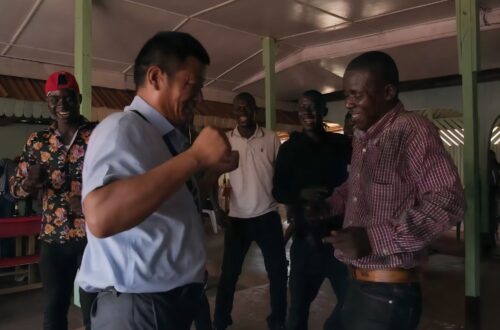The historical poet-painter behind Stephen Chow’s ‘Flirting Scholar’

April is National Poetry Month, and in honor of that, we present Flirting Scholar, a martial-arts comedy whose main character is based off the 15th/16th-century poet Tang Bohu, a romantic, wild figure in the popular imagination whose works are concerned with nature and love.

In Flirting Scholar (唐伯虎点秋香 tángbóhǔ diǎn qiūxiāng) (1993), Stephen Chow (周星馳 Zhōu Xīngchí) brings his trademark nonsense humor to the Ming Dynasty. Chow’s mandatory underdog this time around is Tong Pak Fu (唐伯虎 Táng Bóhǔ), a painter and poet who’s descended from a long line of kung-fu masters. As one of the exalted Four Scholars, Tong is so famous for his artistic abilities that people are willing to fight over his pictures. He also has eight wives, all of whom mock him and have an obsession with gambling. Still feeling alone, Tong falls in love with Chow Heung, a maid for a noble family. Tong decides to pose as a servant to woo the girl, but his deception spirals out of control, to the point that he has to fight an evil scholar and defend his employer’s family.
Like Love on Delivery (破坏之王 pòhuài zhī wáng) (1994) or King of Comedy (喜剧之王 xǐjù zhī wáng) (1999), Flirting Scholar is a romantic-comedy that’s crude, silly, and occasionally dark. Despite the colorful period costumes, it doesn’t make any attempt to be realistic. Characters reference pop culture, swordsmen jump and fly around, and Tong is gifted enough to use an adult man as a paintbrush on a giant canvas. It’s classic Stephen Chow, but Flirting Scholar is also unique, in that it’s based on an actual figure. Tong Pak Fu is Tang Bohu, as he’s known in Mandarin, the courtesy name of the Ming-era artist Táng Yín 唐寅. Contrary to Chow’s depiction, Tang was the son of a restaurant owner, not a powerful martial artist. This isn’t the only artistic liberty taken with Tang’s biography, either.
The real Tang Yin was born in Suzhou in 1470. As a young man, he was a great student, but had a reputation for being reckless. Between 1493 and 1494, Tang’s life was struck by one tragedy after another. His parents, wife, and sister all died over the span of the year. After his mourning period was over, Tang took the prefectural imperial examination in Nanjing, performing better than any other scholar. When he reported to Beijing for the final step in the exam process, Tang partied with his scholar friend Xú Jīng 徐经, bragging that he’d have the same success on the national exam. Not long later, Tang would be eating his words. Along with Xu Jing, he was accused of bribing an official to get a hold of the exam questions.
It’s very likely that Tang and his pal were innocent of the charge, perhaps smeared by a jealous rival. After being tortured, Xu Jing gave a confession, and both he and Tang lost their degrees. Tang was understandably furious. While he was offered a job to be a provincial clerk, Tang considered it to be beneath him. He returned to Suzhou a bitter and resentful man, resorting to art to fill the void of his failed career. Due to his drinking, partying, and spending, Tang came to be seen as a romantic, wild figure. His poems and paintings were concerned with topics like nature and love, and he also made some erotic prints. Eventually, Tang settled in a house he named the Peach Blossom Villa, which he would celebrate in his poetry.
Tang’s house was a common stomping ground for the literary elite in Suzhou. The Four Scholars in Flirting Scholar were real people, the other members of the group being Zhù Yǔnmíng 祝允明, Wén Zhēngmíng 文征明, and Xú Zhēnqīng 徐祯卿 (a.k.a., Zhōu Wénbīn 周文宾). In the movie, they hang out with Tang and wander around ogling women. After a quick poetry competition, Tang’s friends point out Chow Heung in a crowd, making her familiar to Tang. In reality, Tang might have been a womanizer, but the whole story involving Chow Heung is fiction.
As a matter of fact, Tang had only three wives, and he wasn’t married to any of them at the same time. The romantic element of Flirting Scholar has nothing to do with anything that occurred in Tang’s own life. Instead, it traces its roots to stories spread after Tang’s death in 1524. Later writers couldn’t resist the tale of a brilliant, eccentric artist wronged by the authorities. Countless legends, folktales, and rumors quickly sprang around Tang, the most famous of which said that the artist passed himself off as a slave to win a slave-girl’s heart.
The novelist Féng Mènglóng 冯梦龙, writing a century after Tang’s death, created one of the more famous variations on this anecdote for his popular short story collection Stories to Caution the World (警世通言 jǐngshì tōng yán). Feng’s account of Tang makes him out to be a fanciful trickster. He lies his way into becoming a scribe for a wealthy family, where he has his eyes on Qiuxiang, the lady’s head maid. Thanks to his talents and schemes, Tang rises through the ranks of the household. The story ends happily, with Tang marrying Qiuxiang and receiving thousands in silver from his amused master.
Adding to the ballads, plays, and operas adapting Tang’s romance, the 20th century put the story on film and TV. In 1969, Shaw Brothers Studio spinned it as the huangmei-style musical Three Smiles (三笑 Sān Xiào), casting superstar actress Ivy Ling Po (凌波 Líng Bō) as Tang Yin. By the time Stephen Chow and director Lee Lik-chi (李力持 Lǐ Lìchí) got their hands on the material, it’d already been done to death. But it would be a mistake to cast Flirting Scholar off as a simple retread. Thanks to its bizarre humor and well-done fight scenes, Flirting Scholar is a refreshing take on an old standard, as well as a fun ode to an unconventional artist. Just don’t watch the ill-fated Flirting Scholar 2. (Director Lee somehow thought a prequel about the characters without Chow was a good idea.)
https://www.youtube.com/watch?v=FTVHbwQS5mE
Film Friday is The China Project’s film recommendation column. Have a recommendation? Get in touch: editors@thechinaproject.com





